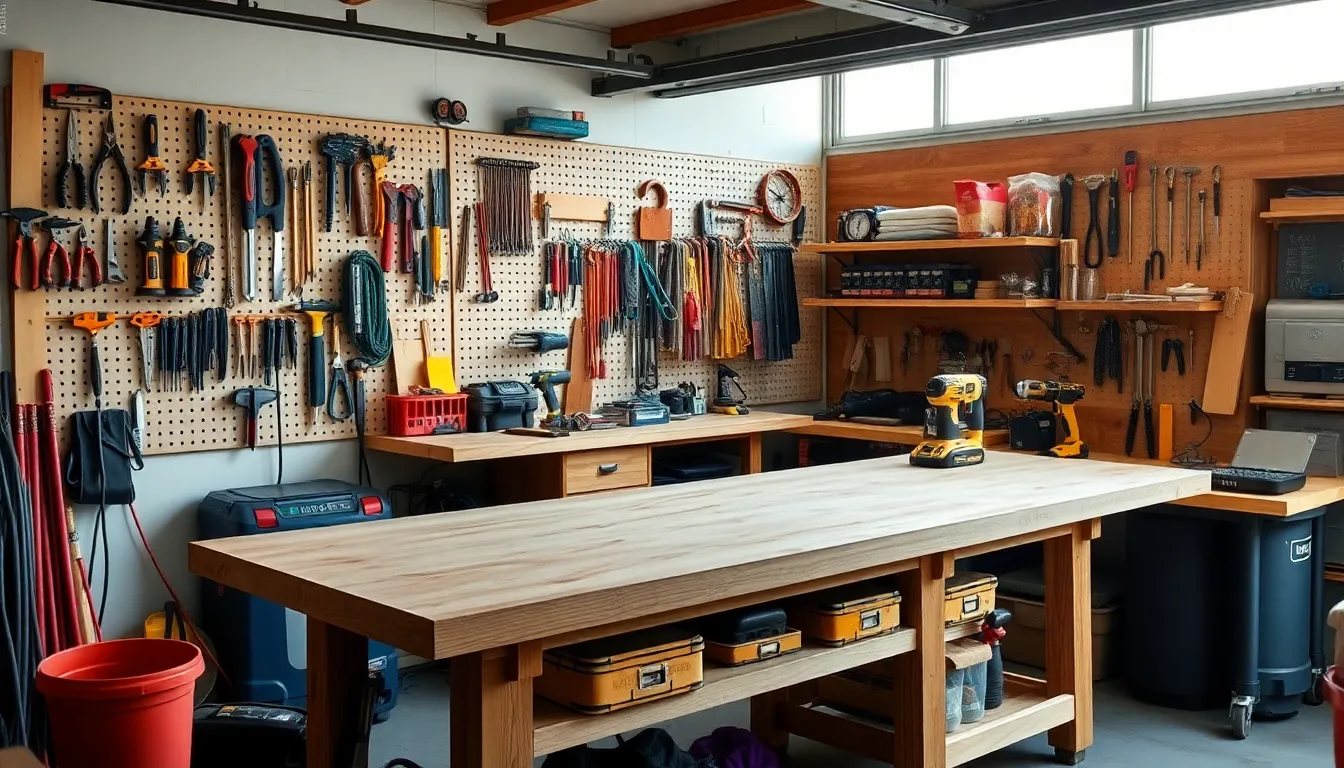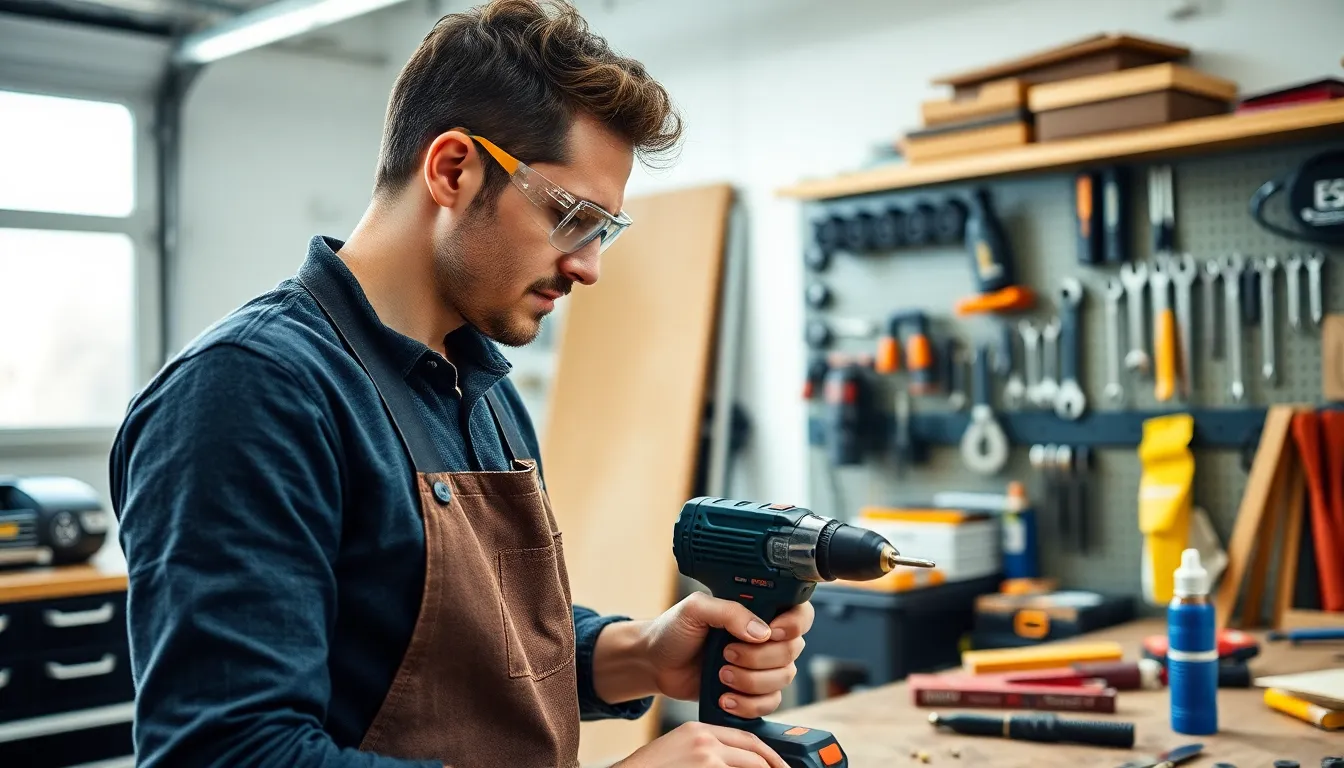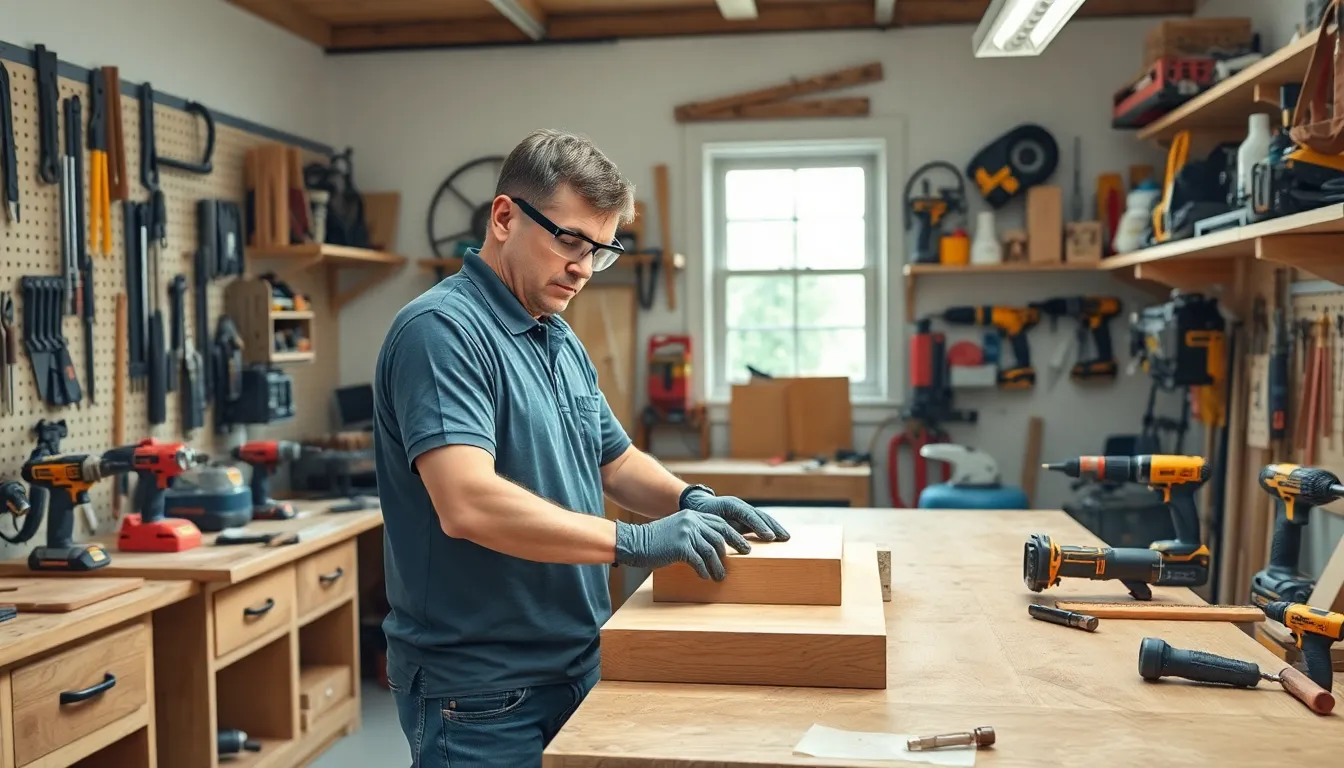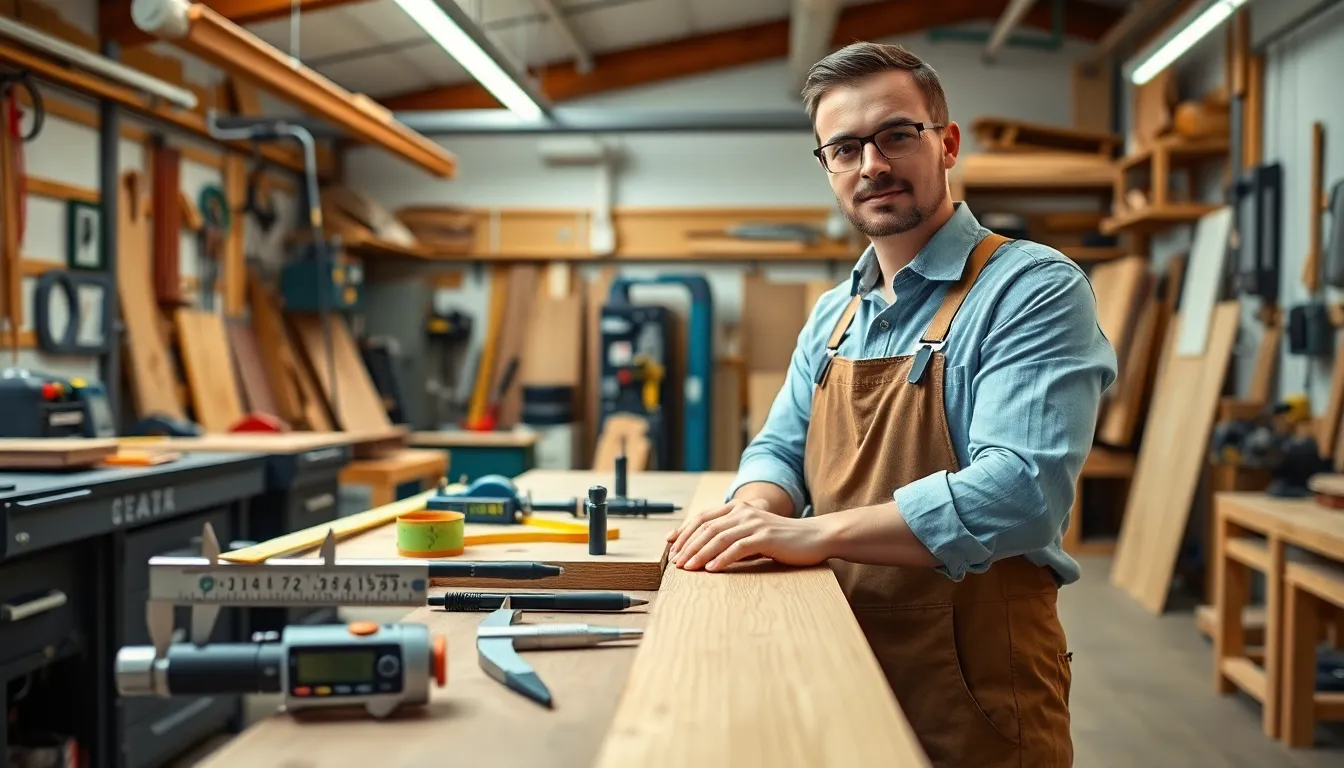Imagine transforming that cluttered corner of your garage into a DIY paradise where creativity flows as freely as the coffee in your mug. A well-planned home workshop isn’t just a luxury; it’s a necessity for anyone serious about their projects. Whether it’s woodworking, crafting, or tinkering with electronics, the right setup can turn a simple idea into a masterpiece—without the chaos of searching for misplaced tools.
But let’s be honest: setting up a workshop can feel like trying to assemble IKEA furniture without the instructions. Fear not! With a bit of planning and a sprinkle of humor, he can craft a space that inspires innovation and keeps the chaos at bay. So grab your toolbelt and let’s dive into the essentials for creating the ultimate home workshop that’ll have neighbors wondering if he’s secretly a DIY wizard.
Table of Contents
ToggleImportance Of A Home Workshop Setup
Creating a home workshop setup proves crucial for DIY enthusiasts. An organized workspace enhances creativity and boosts productivity, allowing individuals to focus on their projects without distractions. Efficiency increases when tools and materials are easily accessible, leading to improved project outcomes.
Individuals working on woodworking, crafting, or electronics benefit from a dedicated area tailored to their specific needs. A workshop fosters skill development, as hands-on experience becomes more frequent in a designated space. A well-structured environment encourages experimentation and innovation, essential for creative growth.
Safety plays a significant role in home workshop setups. When tools are stored properly and safety equipment is within easy reach, accidents decrease substantially. This creates a more secure atmosphere for tackling various projects.
Moreover, personal satisfaction arises from having a space that reflects an individual’s personality and aspirations. Each workshop can showcase personal style through organization, decor, and tool arrangement. This sense of ownership further motivates continued learning and project engagement.
Challenges exist when establishing a home workshop. Budget constraints and space limitations may hinder some setups. Addressing these issues involves prioritization, careful planning, and making necessary adjustments to home layouts.
Adaptations can lead to multifunctional spaces that serve both work and leisure. Balancing aesthetic appeal and functionality ensures a home workshop becomes a sanctuary for creativity. Prioritizing these elements results in a more enjoyable DIY experience, ultimately enriching one’s skill set and passion for creating.
Key Considerations For Your Home Workshop


Setting up a home workshop requires careful thought. Considering both space and tool selection can lead to a highly functional area.
Space Requirements
Evaluate the available space before starting. Adapting a garage, basement, or spare room can work perfectly for a workshop. Ensure the area provides enough room to maneuver comfortably. Prioritizing natural light enhances visibility for detailed tasks. Organizing storage solutions, like shelves and cabinets, helps keep tools and materials accessible. Integrating workbenches provides dedicated surfaces for various projects. If space is limited, utilizing vertical storage can maximize efficiency. Creating a layout that allows for free movement ensures safety and encourages creativity.
Tool Selection
Choose tools based on project needs. Essential hand tools, such as wrenches and screwdrivers, form the basis of any workshop. Investing in power tools like drills and saws can increase project versatility. Opt for quality brands for durability and effectiveness. Assessing specific tasks allows for informed decisions on tool types. Additional accessories, such as clamps and push sticks, enhance safety and precision. Maintaining an organized tool layout reduces frustration during projects. Adding a tool wall or pegboard enables quick access and visibility. Prioritizing multi-functional tools can save space and money.
Essential Tools And Equipment
A well-equipped workshop requires both power and hand tools. These tools provide essential capabilities for various projects, enhancing productivity and precision.
Power Tools
Power tools include equipment driven by electricity or batteries. Common examples are drills, saws, and sanders. These tools speed up tasks significantly, allowing for complex cuts and finishes with minimal effort. For woodworking, a table saw is invaluable, providing accuracy for long cuts. A cordless drill enables mobility and convenience, especially in tight spaces. An orbital sander improves surface finishing, offering smoother results on projects. Prioritize high-quality options that lead to longevity and consistent performance for best results.
Hand Tools
Hand tools consist of manually operated tools that offer versatility. Essential hand tools include screwdrivers, chisels, and wrenches. These tools are fundamental for assembly and detailed work, making them indispensable in any workshop. A set of adjustable wrenches provides the flexibility needed for various fasteners. Quality chisels facilitate precise carving and shaping of wood. Screwdrivers come in different sizes, ensuring that user has the right tool for every screw. Organizing these tools logically streamlines workflow, promoting efficient project execution.
Organizing Your Home Workshop
An organized home workshop enhances creativity and efficiency. It creates an inviting atmosphere, allowing for focus on projects without distractions.
Workspace Design
Creating a functional workspace begins with a clear layout. Position the workbench as a central feature for easy access to tools and materials. Place frequently used items within arm’s reach to streamline workflow. Natural light improves visibility and reduces eye strain; consider incorporating windows or bright lighting. Maintain a clean surface to foster creativity and minimize hazards. Personal touches can inspire motivation, making the space uniquely yours.
Storage Solutions
Utilizing effective storage solutions maximizes space and keeps the workshop organized. Shelving units, cabinets, and pegboards are ideal for tools and supplies. Labeling storage containers ensures quick identification of materials. Drawer organizers work well for hand tools, preventing clutter. Wall-mounted storage systems keep items off the floor and save space. Bins or buckets can store smaller components, while toolboxes protect and transport essential equipment. Emphasizing accessibility and order leads to improved project execution and safety.
Safety Measures In Your Home Workshop
Establishing safety measures in a home workshop is crucial for preventing accidents and injuries. Keep first aid kits stocked and accessible, ensuring they contain essential items like band-aids, antiseptics, and gauze. Positioning fire extinguishers near exits and potential fire hazards is vital for quick access during emergencies.
Wearing appropriate personal protective equipment, such as safety goggles, gloves, and ear protection, greatly reduces injury risks. Using dust masks during sanding or cutting tasks protects against inhalation of harmful particles. Regularly checking equipment for wear and tear helps maintain operating safety; only use tools in good condition.
Organizing a workspace thoughtfully allows for better safety practices. Ensuring walkways are clear of tools and materials prevents tripping hazards. Placing heavy items on lower shelves helps avoid accidents during storage or retrieval.
Implementing clear labeling for hazardous materials or tools ensures users can identify risks quickly. Training all users, including family members, on workshop safety practices fosters a culture of awareness. Establishing a routine for cleanup after projects aids in maintaining an orderly environment.
Following manufacturer instructions for tools and safety equipment maximizes safe usage. Installing proper ventilation systems is also recommended, especially when working with fumes or dust-producing materials. Utilizing ground fault circuit interrupters for electrical tools reduces the likelihood of electrical shocks.
Addressing safety in the home workshop enhances productivity and enjoyment in DIY projects, allowing creativity to flourish in a secure environment.


